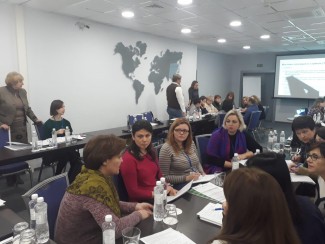UNODC and WHO Organize International Training on Substance Use Treatment and Care during Pregnancy

Kyiv (Ukraine), 18 December 2019 - The United Nations Office on Drugs and Crime (UNODC) jointly with the World Health Organization (WHO) in the framework of the UNODC-WHO Programme on Drug Dependence Treatment and Care, organized an International training on Identification and Management of Substance Use Disorders in Pregnancy.
More than 30 health practitioners, including obstetricians, gynecologists, neonatal care specialists, nurses, as well as specialists in substance use disorders treatment from Ukraine, Moldova and Belarus participated in the three-day workshop, held from 11 to 13 December 2019 in Kyiv.
According to the UNODC World Drug Report, 35 million people globally are considered to have a drug use disorder and are in need of treatment. While one out of three people who use drugs are women, only one out of five persons in treatment are women.
According to relevant studies from different regions, substance use among pregnant women varies widely and reflects differences in drug availability, age, socioeconomic status, and modes of screening. The most popular substance during pregnancy is tobacco use, followed by alcohol, cannabis, and cocaine. It was highlighted by WHO that there is no safe limit for the use of any substance during pregnancy. Treatment services are often not available or accessible to women and pregnant women with substance use disorders. Gender inequality and stigma remain huge barriers for women including pregnant women to access services.
The UNODC-WHO workshop covered public health and clinical aspects of substance use disorder management during pregnancy taking into account the special clinical needs as well as biopsychosocial vulnerabilities of women. Women with substance use disorders are reported to have high rates of anxiety, depression and post-traumatic stress disorder and often have experienced childhood adversity such as physical neglect, abuse or sexual abuse.
As highlighted by Anja Busse, Programme Officer in the UNODC Prevention, Treatment and Rehabilitation Section, during the opening remarks at the training, " Pregnancy can be a powerful motivator to initiate treatment for drug use disorders. All health care practitioners have an important role to screen for substance use during pregnancy and offer adequate support to pregnant women, including access to evidence-based and comprehensive treatment and care services matching their needs."
The training provided an overview of the WHO guidelines on identification and management of substance use and substance use disorders during pregnancy, informed about risks associated with substance use during pregnancy and introduced a pocket guide to support non-specialist health professionals working with pregnant women in their efforts to provide effective clinical services.
A major emphasis in the training was on role plays to learn about screening for substance use and brief interventions to be offered by health care professionals. UNODC and WHO also introduced further clinical management strategies for pregnant women with substance use disorders and evidence-based care for newborns. The workshop ended with a Theory of Change exercise in which all participants identified important priorities and actions to increase the access to quality services for the management of substance use and substance use disorders in pregnancy in their respective countries.
A health practitioner from Kyiv who participated in the meeting said that during her long professional career as a gynecologist, she examined many pregnant women who smoke or drink, and often she did not know what to do in order to help. At the end of the training she felt more confident in asking about substance use in a non judgemental way and providing brief interventions or further referrals for women who use substances or have more severe substance use disorders.
There are powerful international mandates to address the treatment of drug use disorders for women: In 2016 during the special session on drugs the General Assembly of the United Nations (UNGASS, 2016) called for non-discriminatory access to health, care and social services in prevention, primary care and treatment programmes, including those offered to persons in prison or pretrial detention, which are to be on a level equal to those available in the community, and ensure that women, including detained women, have access to adequate health services and counselling, including those particularly needed during pregnancy. Also, the Commission on Narcotic drugs passed important resolutions including on Promoting strategies and measures addressing specific needs of women in the context of comprehensive and integrated drug demand reduction programmes and strategies (2012) and on Mainstreaming a gender perspective in drug-related policies and programmes (2016).
